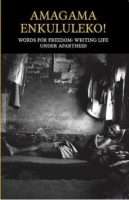Years have passed since and the struggle has not abated; instead, it has intensified.
During the winter term, not long after she had been elected to represent her region on a national educational committee, the police called on her.
It was in the dead of night. An urgent banging rattled the door. The noise rang through the entire house, waking everyone. ‘A fellow student or a relative in some sort of trouble,’ Nobantu thought, distressed, as she got out of bed. She hurried to the door. Her grandmother groaned in the adjacent room. Passing her parents’ bedroom she heard them stirring. Her father grumbled and inquired who on earth was at the door at such an ungodly hour. Before she herself could pose the question, a voice above the banging summoned: ‘Open! We are the police. Open!’
She unbolted the door. There in the darkness she saw three figures. At the sight of them her first reflex was to shut them out and flee into the safety of the house. She remained calm, however, and asked:
‘What do you want?’ She spoke tersely, and remained standing in the doorway.
The figure at the centre spoke. ‘I’m Captain Koekemoer, from State Security. I have a warrant to search this house.’ He pressed forward, assuming that Nobantu would give way and let him in. She didn’t budge. An urge to resist their intrusion took hold of her. Still blocking the entrance she demanded:
‘Let me see that warrant. I want to make sure I know who I’m dealing with.’
She spoke with a firm and slightly contemptuous voice. The anger their presence provoked in her was evident. Koekemoer handed her the warrant; even in the dark his gesture was clearly aggressive.
‘Wait here, ‘ she said, ‘I want to go over this. I want to make sure who I’m letting into this home.’ As she moved away from the door, Captain Koekemoer and his two companions pressed in after her, uninvited. This infuriated Nobantu, but she remained calm.
As she lit a candle she snapped at them: ‘Get out, and wait until I give you permission to enter.’
‘We don’t need your permission. That warrant permits us to enter this place,’ Koekemoer retorted coldly.
By the time she had examined the warrant they had already begun their search. First the cupboards. Then the bookshelves. They ripped open cushions and mattresses. They ordered her grandmother out of bed. Her father tried to intervene, pointing out her age and frailty. He was threatened and warned not to obstruct the course of the law. After several hours they left without a shred of evidence. Like predators, they had come to gorge themselves on a family’s intimate space. They left the house in a state of ruin.
Whenever Nobantu recalls this occasion, and in the past week she has gone over it obsessively, the awareness of some ominous bird kept surfacing in her mind without it ever coming into sharp focus. At times she related the sensation of beating wings to the commotion and turmoil of the frequent raids on her home and, later on her place of work. This, however, did not disclose the enigmatic nature of the sensation plaguing her.
To distract herself, she gets up, climbs onto the bed in an attempt to peer out of the small window. When she does not succeed, she once again settles herself on the bed, and thinks of the intervening years.
After leaving school she became increasingly involved in the labour movement. Her interest in educational and cultural issues inspired her to become involved with the establishment of a cultural organisation directly related to the life of workers and their families. As could be expected, this resulted in even greater harassment. Koekemoer and his assistants would arrive regularly. They would ransack the house. They would question her on her cultural activities.
She noticed that they tried to vary the times and styles of their intrusions, but it was not difficult for her to anticipate their actions. What they considered a change in approach, remained for her the same old intimidation, abuse and violations for which he and his ilk have become so notorious.
On one of the visits, she watched him. A short, podgy man with rusty hair. He and his two helpers sniffed through her belongings. In her wardrobe he came across a new, and still unopened, packet of underwear. He seized on it with such zeal, one would have thought he had just unearthed some incriminating evidence.
‘What do we have here?’ he said, and held up the packet to the amusement of his helpers. ‘Don’t tell me you keep your secrets in such places,’ he added gleefully.
The effort to provoke her was so obvious, it made Nobantu chuckle. If this was supposed to be his form of psychological harassment, then it was not only ineffective but also telling of the man’s stupidity. He must have been told that people are inclined to be perturbed when intruders paw among their intimate belongings. However, by seizing on a new and unused packet of underwear, Koekemoer’s crude understanding of this intimate code was apparent.
‘If you want to upset me by pawing at my underwear then you will have to mess among some of the things I have worn, Captain,’ she said sarcastically.
Koekemoer tried to conceal his embarrassment, but Nobantu approached him with her eyes fixed on his face. In a state of mild panic, he dropped the packet and called off the search. He made for the door and his men trooped after him into the night. Nobantu sighed with relief. She was happy to be rid of them so quickly.


